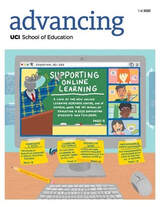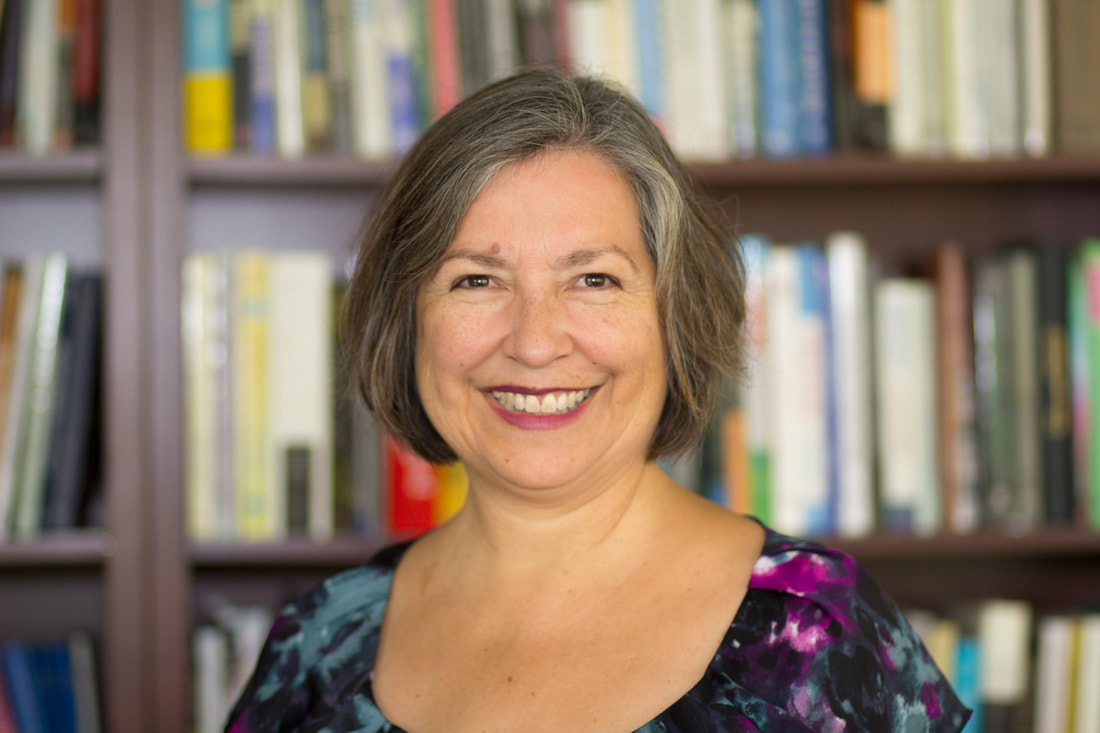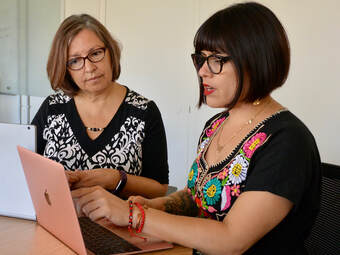Addressing a Need
Professor Elizabeth Peña is leading efforts to create an online testing procedure for identifying developmental language disorders while simultaneously establishing a Special Education emphasis at the UCI School of Education.
In spring, when COVID-19 forced educators to deliver coursework online, Professor Elizabeth Peña realized a unique opportunity was available to influence the future direction of support for the field of language development testing.
The current system of determining developmental language disorders (DLDs) is flawed. For starters, tests must be administered in person by a bilingual speech-language pathologist. Additionally, while the American Speech-Language-Hearing Association has a membership of more than 200,000, Peña estimates that only four percent – approximately 8,000 – speak another language. Meanwhile, 20 percent of children in the U.S. entering school speak at least two languages. In California, 40 percent of children entering school speak another language in addition to English.
“There are considerably more children who are English learners than can be served by the current 8,000 certified bilingual pathologists,” Peña said.
The inability to serve children under the current system is a major concern. Children could be under-identified for language impairment when testing is needed, but not administered, or they can be over-identified as having a language impairment when no language impairment exists. Two recently awarded five-year grants are supporting Peña’s efforts to address this need.
The current system of determining developmental language disorders (DLDs) is flawed. For starters, tests must be administered in person by a bilingual speech-language pathologist. Additionally, while the American Speech-Language-Hearing Association has a membership of more than 200,000, Peña estimates that only four percent – approximately 8,000 – speak another language. Meanwhile, 20 percent of children in the U.S. entering school speak at least two languages. In California, 40 percent of children entering school speak another language in addition to English.
“There are considerably more children who are English learners than can be served by the current 8,000 certified bilingual pathologists,” Peña said.
The inability to serve children under the current system is a major concern. Children could be under-identified for language impairment when testing is needed, but not administered, or they can be over-identified as having a language impairment when no language impairment exists. Two recently awarded five-year grants are supporting Peña’s efforts to address this need.
DEVELOPING A NEW TEST
|
In January, the National Institute on Deafness and Other Communication Disorders of the National Institute of Health awarded Peña a $3.18 million grant, Test of English Language Learners (TELL).
As part of the grant, Peña and her team will create and validate a table-based test that speech-language pathologists can administer, in English, to children who are in the process of learning English as a second language. The test will be sensitive to language impairment but will not over-identify children because of a lack of English proficiency. Speech-language pathologists and special educators who need to assess bilingual children’s language ability will be able to use computers or tablets to administer TELL. “I saw a need for validated online testing, both to respond to the current recommendations for social distancing and to address critical needs in the field of language acquisition testing,” Peña said. |
The TELL test will target Spanish- and Vietnamesespeaking English Language Learners (ELLs), ages four to nine, in both their first language and in English, with the goal of differentiating language impairment from language difference.
“This is a completely new approach. The two groups of children that will be tested – 525 Spanish ELLs and 525 Vietnamese ELLs – use very different languages,” Peña said. “We will be tracking normal developmental errors, acquisition errors, and DLD and comparing our findings between the two languages.”
Because of the pandemic, investigators on the TELL project have had to rethink their data collection approach. A core team of four doctoral students – Cecilia Perez, Michelle Ramos, Jiali Wang, Taffeta Wood, as well as postdoctoral scholar Amy Pratt and undergraduate Miriam Muñoz – worked over the summer to develop and pilot test procedures and questions that will be used in TELL testing.
In the summer, students on the Integrated Research Training: Language and Literacy Disabilities project also worked alongside the School of Education’s Orange County Educational Advancement Network (OCEAN) to strengthen relationships with Orange County partner institutions in preparation for the community-based component of their training.
“The TELL project was one of the things that motivated me to come to UCI and work with Dr. Peña,” Ramos said. “In my previous clinical experience, I trained monolingual speech-language pathologists on assessment practices for English Language Learners and saw firsthand the great need to equip these clinicians with better tools.”
Peña and her teams are optimistic that results from the grant will expand to serve most children who may be experiencing development language disorders.
“Our intent is that our findings, and the TELL test, will prove useful in the future with similar Romance and Asian languages and thus apply to 90 percent of the languages spoken in the U.S.”
“This is a completely new approach. The two groups of children that will be tested – 525 Spanish ELLs and 525 Vietnamese ELLs – use very different languages,” Peña said. “We will be tracking normal developmental errors, acquisition errors, and DLD and comparing our findings between the two languages.”
Because of the pandemic, investigators on the TELL project have had to rethink their data collection approach. A core team of four doctoral students – Cecilia Perez, Michelle Ramos, Jiali Wang, Taffeta Wood, as well as postdoctoral scholar Amy Pratt and undergraduate Miriam Muñoz – worked over the summer to develop and pilot test procedures and questions that will be used in TELL testing.
In the summer, students on the Integrated Research Training: Language and Literacy Disabilities project also worked alongside the School of Education’s Orange County Educational Advancement Network (OCEAN) to strengthen relationships with Orange County partner institutions in preparation for the community-based component of their training.
“The TELL project was one of the things that motivated me to come to UCI and work with Dr. Peña,” Ramos said. “In my previous clinical experience, I trained monolingual speech-language pathologists on assessment practices for English Language Learners and saw firsthand the great need to equip these clinicians with better tools.”
Peña and her teams are optimistic that results from the grant will expand to serve most children who may be experiencing development language disorders.
“Our intent is that our findings, and the TELL test, will prove useful in the future with similar Romance and Asian languages and thus apply to 90 percent of the languages spoken in the U.S.”
EMPHASIZING SPECIAL EDUCATION
Peña also received a training grant from the U.S. Department of Education (Office of Special Education and Rehabilitation Services) to develop a Special Education emphasis in the School of Education’s Ph.D. in Education program.
The training grant will prepare graduates for leadership positions as researchers and faculty who will train special education, early intervention, and related services personnel. As a bonus, implementation of the training grant is creating a cluster of graduate researchers who are working on existing projects, including the TELL project.
“I see the training grant as being complementary to the TELL grant and to projects that several faculty are pursuing, including Assistant Professor Jade Jenkins’s Head Start project and Associate Professor Stephanie Reich’s Development in Social Context Lab,” Peña said.
It is the first pre-doctoral training grant in the School of Education’s history.
Peña and Associate Professor Penelope Collins are completing the recruitment of 10 doctoral students for the training grant. Student experiences during their five years of support will include four specialized classes, a year of faculty-mentored research in Special Education, and a community-based Special Education rotation in a school or district, where students will participate in training or data analysis.
The School of Education and UCI Graduate Division contributed an additional $1.25 million – matching the $1.25 million from the U.S. Department of Education – to support the development of the critically important emphasis.
“The School of Education is committed to improving educational opportunities and outcomes for everyone, regardless of background, and to training our students to carry out the same charge when they themselves become educators,” said Richard Arum, dean and professor, UCI School of Education. “This grant allows us to make sure that we are imbuing our highly talented doctoral students with the skills necessary to support an underserved population.”
The training grant will prepare graduates for leadership positions as researchers and faculty who will train special education, early intervention, and related services personnel. As a bonus, implementation of the training grant is creating a cluster of graduate researchers who are working on existing projects, including the TELL project.
“I see the training grant as being complementary to the TELL grant and to projects that several faculty are pursuing, including Assistant Professor Jade Jenkins’s Head Start project and Associate Professor Stephanie Reich’s Development in Social Context Lab,” Peña said.
It is the first pre-doctoral training grant in the School of Education’s history.
Peña and Associate Professor Penelope Collins are completing the recruitment of 10 doctoral students for the training grant. Student experiences during their five years of support will include four specialized classes, a year of faculty-mentored research in Special Education, and a community-based Special Education rotation in a school or district, where students will participate in training or data analysis.
The School of Education and UCI Graduate Division contributed an additional $1.25 million – matching the $1.25 million from the U.S. Department of Education – to support the development of the critically important emphasis.
“The School of Education is committed to improving educational opportunities and outcomes for everyone, regardless of background, and to training our students to carry out the same charge when they themselves become educators,” said Richard Arum, dean and professor, UCI School of Education. “This grant allows us to make sure that we are imbuing our highly talented doctoral students with the skills necessary to support an underserved population.”
IMPROVING COMMUNICATION
|
Growing up in an immigrant, Spanish-speaking household piqued Peña’s interest in bilingualism and semantics, and how children learn to juggle and access each of their two languages. She credits a series of caring mentors for encouraging her career choices – her undergraduate research advisor Susan Sordon at the University of Redlands, her clinical mentor at San Jose State University, Gloria Weddington, Ph.D. advisor Aquiles Iglesias at Temple University, and long-time collaborator Tom Marquardt at the University of Texas.
Peña is a certified speech-language pathologist and a fellow of the American Speech-Language-Hearing Association. “While working as a bilingual speech-language pathologist, I saw that children who were bilingual were often misidentified as language delayed because they didn’t know enough English – or mislabeled as having language differences when it was apparent that they needed special education supports,” Peña said. |
Peña considers Southern California, with its richness of languages, and UCI, with its high-level scholarship and interdisciplinary focus, an exciting research environment.
“DLD is one of the most common childhood disabilities that people don’t know much about,” Peña said. “These kids are in every classroom that teachers will teach, they are in our universities, and we find young people with DLD in all walks of life. DLD affects other aspects of learning as well – reading and math in particular.”
As director of the School of Education’s Human Abilities in Bilingual Language Acquisition (HABLA) Lab, Peña collaborates with colleagues on research and mentors student researchers on studies of bilingualism, language impairment, and test development and treatment. Lab projects focus on understanding how bilingual individuals organize and access their two language systems.
Peña also serves as the School of Education’s associate dean of faculty development and diversity.
“I see my role as supporting initiatives that will help us to build trust and community, where we can truly listen to each other and to different perspectives and where we make changes through our actions.”
“DLD is one of the most common childhood disabilities that people don’t know much about,” Peña said. “These kids are in every classroom that teachers will teach, they are in our universities, and we find young people with DLD in all walks of life. DLD affects other aspects of learning as well – reading and math in particular.”
As director of the School of Education’s Human Abilities in Bilingual Language Acquisition (HABLA) Lab, Peña collaborates with colleagues on research and mentors student researchers on studies of bilingualism, language impairment, and test development and treatment. Lab projects focus on understanding how bilingual individuals organize and access their two language systems.
Peña also serves as the School of Education’s associate dean of faculty development and diversity.
“I see my role as supporting initiatives that will help us to build trust and community, where we can truly listen to each other and to different perspectives and where we make changes through our actions.”




